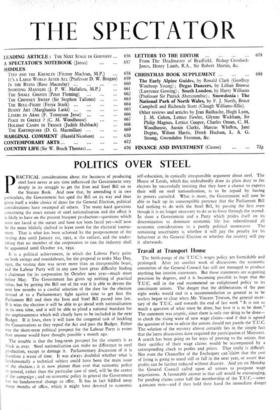POLITICS OVER STEEL
pRACTICAL considerations about the business of producing steel have never at any time influenced the Government very deeply in its struggle to get the Iron and Steel Bill on to the Statute Book. And now that, by amending it in two particulars, the Government has sped the Bill on its way and thus given itself a wider choice of dates for the General Election, political considerations have swamped all others. The many hard questions concerning the exact nature of steel nationalisation and the effect it is likely to have on the present buoyant production—questions which were not faced at the outset and have not been faced yet—will now be the more blithely shelved to leave room for the electoral tourna- ment. That is what has been achieved by the postponement of the vesting date until January 1st, 1951, at the earliest, and the under- taking that no member of the corporation to run the industry shall be appointed until October tst, 1950.
It is a political achievement, in which the Labour Party gains on both swings and roundabouts, for the proposal to make May Day, 195o, the vesting date was never more than an irresponsible boast, and the Labour Party will in any case have great difficulty finding a chairman for its corporation by October next year—much more before May. The Government has given up nothing of practical value, but by getting the Bill out of the way it is able to devote the next few months to a careful selection of the date for the election instead of to a Parliamentary fight against time to get first the Parliament Bill and then the Iron and Steel Bill passed into law. If it wins the election it will be able to go ahead with nationalisation in its own time, and it will be able to plead a national mandate for the unpleasantness which will clearly have to be included in the next Budget. If it loses, then it will have the congenial task of heckling the Conservatives as they repeal the Act and pass the Budget. Either way the short-term political prospect for the Labour Party is rosier than anyone would have thought possible a month ago.
The trouble is that the long-term prospect for the country is as black as ever. Steel nationalisation can make no difference to steel production, except to damage it. Parliamentary discussion of it is therefore a waste of time. It was always doubtful whether what is fundamentally a technical subject could have been the main issue of the election ; it is now plainer than ever that ecenomic policy in general, rather than the particular case of steel, will be the centre of the campaign ; and on economic policy in general the Government lus no fundamental change to offer. It has in fact fiddled away many months of office, which it might have devoted to economic
self-education, in cynically irresponsible argument about steel. The House of Lords, which has undoubtedly done its plain duty to the electors by successfully insisting that they have a chance to express their will on steel nationalisation, is to be repaid by having its powers curtailed. What is more, the Government will now be able to back up its contemptible pretence that the Parliament Bill had nothing to do with the Steel Bill, by passing the first even though it is no longer necessary to do so to force through the second. In short a Government and a Party which prides itself on its determination to dominate economic life has subordinated all economic considerations to a purely political manoeuvre. The remaining uncertainty is whether it will pay the penalty for its behaviour at the General Election or whether the country will pay it afterwards.














































































 Previous page
Previous page